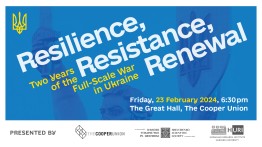Resilience, Resistance, Renewal: Two Years of the Full-Scale War in Ukraine
Friday, February 23, 2024, 6:30 - 8pm

After two years of Russia’s full-scale war of aggression against Ukraine, the world continues to be inspired by Ukrainian resilience and resistance. On the eve of the two-year anniversary, leading experts convene to reflect on the brutal war and Ukraine's path forward. Speakers include 2022 Nobel Peace Prize winner and head of the Center for Civil Liberties, Oleksandra Matviichuk; Volodymyr Yermolenko, president of PEN Ukraine; and Kristina Hook, nonresident senior fellow with the Atlantic Council’s Eurasia Center.
Topics for discussion include: What does an act of Ukrainian resistance look like? What are the obstacles confronting Ukrainian society and its partners abroad? How can Ukraine safeguard its culture and identity as cities are being razed to the ground? How are disinformation campaigns shifting public discourse?
Registration required. Please note this free event is first-come-first-served, and an RSVP does not guarantee admission.
About the Panelists
A Ukrainian human rights lawyer, Oleksandra Matviichuk heads the human rights organization Center for Civil Liberties, the first Ukrainian organization to receive the Nobel Peace Prize. She has been with the organization which works to protect human rights and establish democracy in Ukraine and the OSCE region since its founding in 2007. In 2021, Matviichuk was nominated to the United Nations Committee against Torture, making history as Ukraine's first female candidate to the UN treaty body. She attended Taras Shevchenko National University of Kyiv.
Volodymyr Yermolenko is a Ukrainian philosopher, journalist, and writer who serves as the president of PEN Ukraine. A recipient of the Yurii Sheveliov Prize and Petro Mohyla Award, he also serves as analytics director at Internews Ukraine, editor-in-chief of UkraineWorld.org, and an associate professor at Kyiv-Mohyla Academy. His work has appeared in outlets such as The Economist, the Financial Times, and The New York Times.
Kristina Hook is a nonresident senior fellow with the Atlantic Council’s Eurasia Center. She specializes in genocide and mass atrocity prevention, emerging technologies, and post-conflict reconstruction. She is also an assistant professor of conflict management at Kennesaw State University, where she specializes in genocide prevention and international human rights. An expert in Ukraine-Russian relations, she is a former Fulbright Scholar to Ukraine and has served as a U.S. Department policy advisor for mass atrocity prevention. She received her Ph.D. in anthropology and peace studies from the University of Notre Dame.
Located in The Great Hall, in the Foundation Building, 7 East 7th Street, between Third and Fourth Avenues




